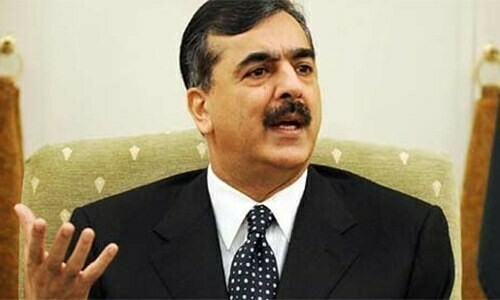AMIDST more Pakistan-India jingoism and hyperbole, the Pakistani high commissioner to India, Abdul Basit, has struck a sensible note. Rejecting India’s claims of a cross-LoC strike against Pakistani security forces in interviews with the Indian media, Mr Basit has emphasised that all problems between the two countries need to be resolved through dialogue. The high commissioner’s measured comments may seem out of step with the near-hysterical commentary in sections of the Indian state and media — hysteria that some in Pakistan are more than willing to indulge in as well — but a dialogue-oriented approach is precisely what is needed as tensions in the region threaten to spiral out of control once again.
The problem with overheated rhetoric ought to be apparent: there is the threat of devastating firepower behind it. Take the letter written by Indian Air Force chief B.S. Dhanoa that the Indian media recently revealed has been sent to every officer under his command and in which the air chief marshal warns that the air force must be prepared to act on “very short notice” because of a “sub-conventional threat” allegedly emanating from Pakistan. As news of the letter spread, the Pakistan Air Force chief Sohail Aman warned that any aggression by India would be met with a response that would be remembered for generations. Both the Pakistani and Indian air chiefs command fleets of aircraft that can deliver nuclear weapons. Surely, while they need to maintain the morale and readiness of the forces at their command, they must do so in a manner that does not stir public anxiety or stoke jingoism. Elsewhere too, among sections of both states and the media, the rush to brinkmanship and one-upmanship is of great concern. It does not matter that Pakistan-India history reflects many such instances of rhetorical tumult and low-level skirmishes; what matters is that these may lead to wider conflict the next time.
Worrying too is the tendency of the government of Prime Minister Narendra Modi to squeeze the few people-to-people initiatives that still exist. From targeting student delegations to effectively declaring a moratorium on all sporting ties with Pakistan, the Indian government seems to believe that punishing the people here is a justifiable tactic. The Indian pressure may lead to the Pakistani state resorting to similar actions, potentially causing a rupture in the tenuous people-to-people contacts that have been sustained in even tension-ridden times. With the Pakistani and Indian media already virtually shut out of the market in the other’s country, the severing of all ties between the two populations would leave just the states to determine bilateral ties. Given the tendency of the two countries to respond to provocations rather than find peaceful solutions through dialogue, the prospect of such a freeze in people-to-people ties should be of deep concern.
Published in Dawn, May 25th, 2017










































